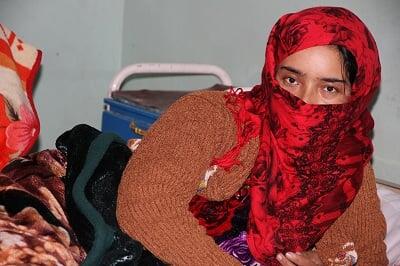"I got married when I was 21 years old and I became pregnant soon after. Everything went well until my labour pain started", she recalls. Arifa lives in a remote village called Tejab in Almar district where access to healthcare is a luxury for many people. In these types of villages pregnant women often get help from a daya, a woman who helps to deliver a baby. A daya does not have any medical background. The only knowledge she possesses is of experience.
Shame
During Arifa's labour a daya was present. Because her baby was too big and she was too weak she had difficulties giving birth. While she was pushing, the daya was pushing on her stomach. A healthy baby was born. Ever since she could not hold her urine or faeces. "I had to wash myself several times a day. It was so disgusting and I felt ashamed of myself", she tells.
Arifa and her mother were at the end of their tether until they visited a doctor in Maimana who referred them to Malalai Hospital in Kabul. There they met Dr Shukria Zaman, an obstetric fistula surgeon trained by UNFPA, the United Nations Population Fund. "When I first met Arifa, she was feeling ashamed and suffering a lot from her condition. I explained what had happened to her and what obstetric fistula is. I tried to comfort her by telling her that she is not the only one who suffers from fistula", says Zaman.
The doctor operated her and everything went well. Usually fistula patients spend months at the hospital, especially those living in remote villages, because the doctors want to closely monitor their recovery. After a while Arifa started to miss her home and she wanted to go back. "I advised her not to go because she was not fully recovered. Also I warned her that she could get an infection", tells Zaman. "But she didn't listen and very soon Arifa got a severe infection", she continues.
Infection
Together with her mother and her son, Arifa came back to Kabul and Dr Zaman took care of her. The infection caused another hole in her vaginal area. By cleaning and washing the infection with anti-septic liquids the hole is slowly closing. Arifa is not yet fully recovered but she is on the right path.
Malalai Hospital is the only governmental health facility in Afghanistan with a Fistula Ward. Since 2007, UNFPA is supporting the Ward by training the surgeons. Today, the hospital reports a 95 percent success rate and has treated an estimated 950 fistula cases in the last five years. UNFPA has also supported the Afghanistan Society of Obstetricians and Gynaecologists in providing training on the prevention of fistula.
To help women like Arifa accessing healthcare services, especially skilled birth attendant, UNFPA is piloting the Family Health House model. These are community-based health structures serving 1,500-4,000 people and staffed by a trained Community Midwife recruited from the local population who provides reproductive, maternal, new-born, and child health services. UNFPA has opened 80 Family Health Houses to date in Bamiyan, Daikundi and Faryab provinces and nine mobile support teams are operational including in Herat and Badakhshan.


